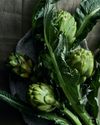
Slowly rotating the plate to inspect the layers, I quell my impetuous niece who's ready, spoon raised, like a cat about to pounce on its prey. I explain that this is the original, legendary tiramisù, which warrants our attention before being devoured.
We are at Le Beccherie in Treviso, an elegant city in Veneto, 50 kilometres, or about 30 minutes by train, from Venice.
Perched on stools at a high table near the pass, the only available seats in the busy restaurant, I grab my iPhone and snap away. After several protests and "hurry ups", we each take a spoonful before harmonising our "mm-mmms" a cappella.
Their classic tiramisù is luscious and light, silky yet textured, with a good coffee hit, and a dusting of bitter cacao that's balanced with the sweet mascarpone cream.
Treviso's traditional tiramisù is made with six specific ingredients: bitter cocoa, coffee, mascarpone, savoiardi or ladyfinger biscuits, egg yolks (no whites) and granulated sugar.
Le Beccherie is widely accepted as the inventor of tiramisù because, in 1972, the restaurant claims it was the first to list it on a menu. However, the origin of the well-loved dessert is somewhat trifled.
One legend has it that it was served at a brothel in Treviso after "the act", to give an energy boost to customers before returning home to their wives. That brothel was called Tre Scalini, which closed in 1958, and it's said that the salacious nature of tiramisù was a deterrent for any public association.
Another is that in Veneto, a version of tiramisù was fed to pregnant women, nursing mothers and sick children to help build up their strength. In the mid-1950s and 1960s, this is what led Le Beccherie to develop the classic tiramisù we know today, and it's the reason it never contains liqueur.
This story is from the {{IssueName}} edition of {{MagazineName}}.
Start your 7-day Magzter GOLD free trial to access thousands of curated premium stories, and 9,000+ magazines and newspapers.
Already a subscriber ? Sign In
This story is from the {{IssueName}} edition of {{MagazineName}}.
Start your 7-day Magzter GOLD free trial to access thousands of curated premium stories, and 9,000+ magazines and newspapers.
Already a subscriber? Sign In

From personal experience
Former Hope St Radio chef ELLIE BOUHADANA invites you to gather your loved ones and enjoy an evening of good food and laughter with recipes from her new cookbook, Ellie's Table.

Kimberley Moulton
Kylie Kwong celebrates the individuals helping to grow a stronger community. This month, we applaud the international curator and Yorta Yorta woman who is shining a light on First Peoples.

Tom Wallace
We share a drop with the head winemaker for Devil's Corner, Tamar Ridge and Pirie Sparkling, a master of cool-climate grapes.

Best in class
The top drops to keep an eye out for on wine lists (and why they're worth the splurge)

A taste of refuge
Fleeing war and persecution, Australia's new arrivals push our food culture forward. DANI VALENT explores the contributions of the country's refugee communities.

BE OUR GUEST
Inspired by the sense of place conjured by Europe's Michelin-star restaurants, local restaurateurs are expanding their hospitality remit to include accommodation

Barcelona BUZZ
A popular drawcard for digital nomads and expats alike, the Catalonian capital offers equal parts sophistication and fun. Here, DANI VALENT discovers the latest dining hotspots.

HEATHCOTE BOUND
MICHAEL HARDEN hits the road to explore regional Victoria's Heathcote, home to this year's Best Destination Dining and a host of other delights.

The art of...relishing restaurants
Does working in hospitality make someone a better or worse diner

HEART AND SOUL
Not a vegetable but rather a flower bud that rises on a thistle, the artichoke is a complex delight. Its rewards are hard won; first you must get past the armour of petals and remove the hairy choke. Those who step up are rewarded with sweet and savoury creaminess and the elusive flavour of spring. Many of the recipes here begin with the same Provençal braise. Others call on the nuttiness of artichokes in their raw form. The results make pasta lighter and chicken brighter or can be fried to become a vessel for bold flavours all of which capture the levity of the season.